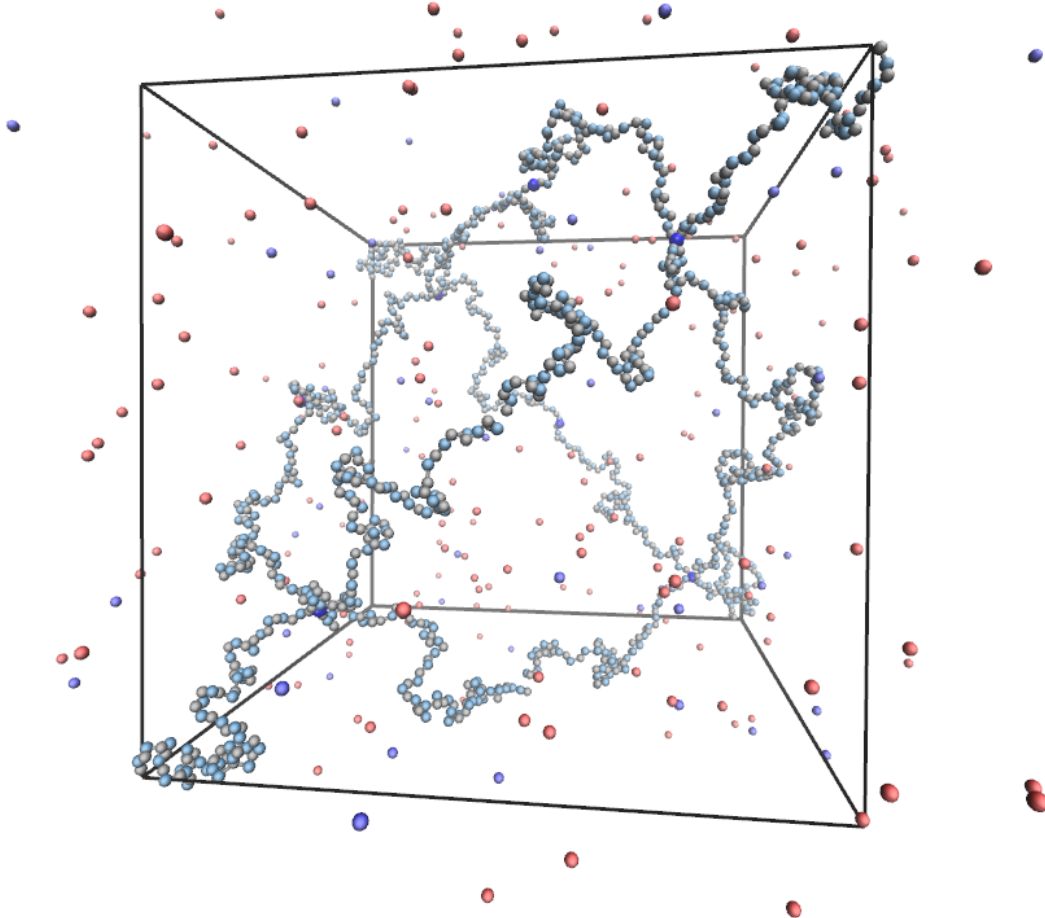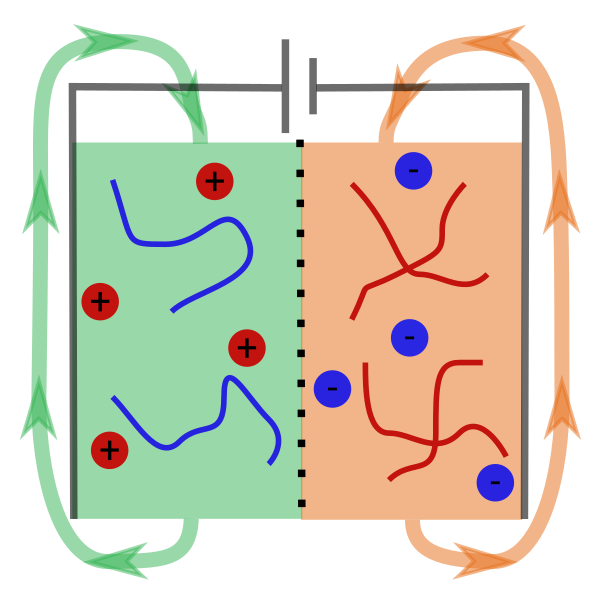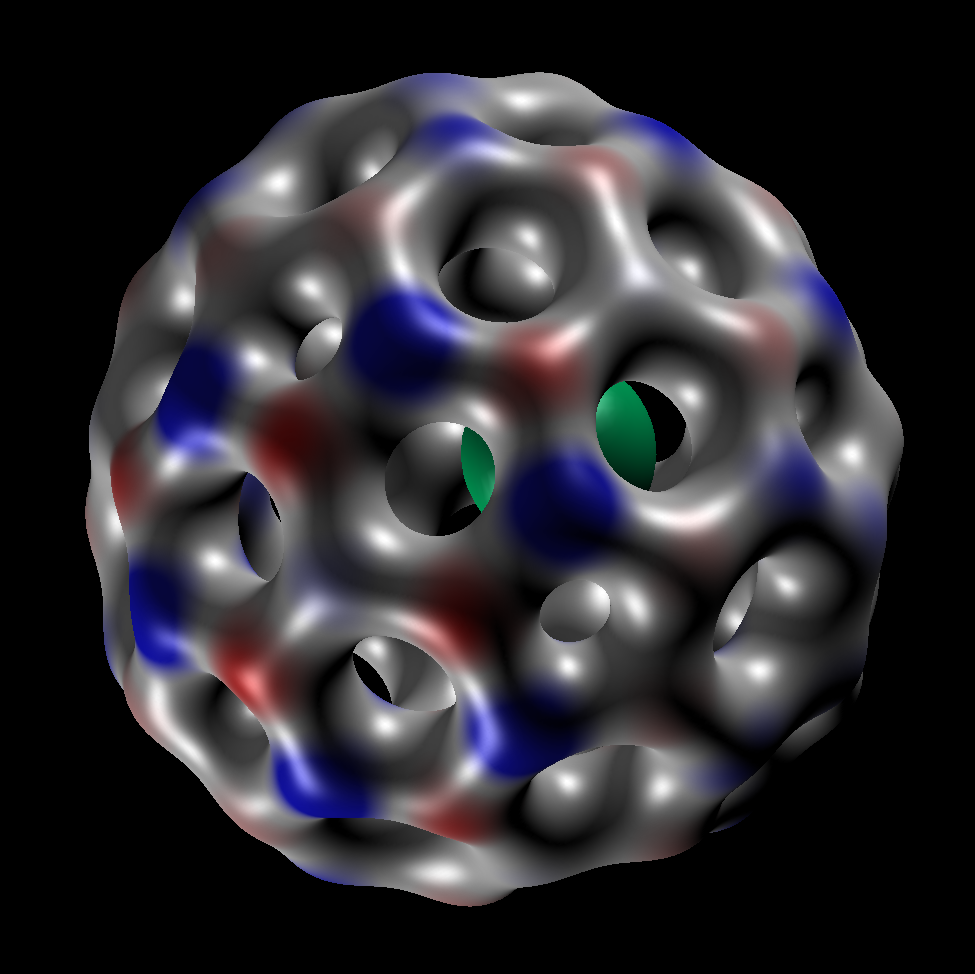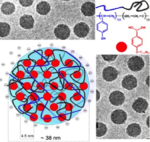Open positions in the Soft Matter research group
All positions are available until filled.
PhD positions can be modified to become Master or Bachelor projects
Multiscale modeling of responsive polymer gelsModeling of solutions of redox-active polymers for applications in redox flow batteries
Modeling of complex polymer systems
Theoretical studies of endohedral fullerenes
Polymeric Nanostructures Containing Boron Compounds
Profile of an ideal candidate
Additional information of general interest
Multiscale modeling of responsive polymer gels
|
type of position: PhD (also Master or Bachelor) supervisor: Dr. P. Košovan (contact) Abstract: This project targets modeling of polymeric gels at different levels of approximation to extend the range of tractable length scales. It combines coarse-grained models using explicit particles with mean-field models based on local density variations to account for local inhomogeneities due to partial collapse of responsive gels or due to irregular crosslinking inherent to most real-world gels. This approach opens up possibilities to study systems which could not be modeled by traditional means. The gola is to validate specific combinations of methods and approximations against explicit particle simulations and then to apply them in order to predicte the structure-property relations in experimentally relevant systems: double-responsive gels, amphiphilic co-networks and irregular gels. The developed methods will be used to support interpretation of specific experiments in external collaboration with several experimental groups. Before you send an application, please check the profile of an ideal candidate |

|
Modeling of solutions of redox-active polymers for applications in redox flow batteries
|
type of position: PhD (also Master or Bachelor) supervisor: Dr. P. Košovan (contact) Abstract: For efficient exploitation of renewable energy sources such as solar or wind, flexible and scalable energy storage is desired. Redox-flow batteries (RFB) present a promising alternative for such large-scale application. Polymer-based electrolyte solutions have been proposed as an affordable, safe, non-toxic and scalable solution for RFBs [Nature 78, 527 (2015)]. The team lead by Dr. Košovan has recently joined an international collaboration aimed at development of polymer systems for RFB applications. The goal of this PhD project is to employ coarse-grained simulations to study changes in solutions that occur upon charging of polymers due to the applied electric potential. The results will help to understand the relation between the polymer architecture and its energy storage capacity, solubility, and solution viscosity. In collaboration with experimentalists doing synthesis, characterization, and commercial implementation of the studied materials, the simulation results will be used to guide the selection of materials for improved performance. Before you send an application, please check the profile of an ideal candidate |

|
Modeling of complex polymer systems
|
type of position: PhD (also Master or Bachelor) supervisor: Assoc. prof. F. Uhlík Abstract: Nanostructures based on polymers have numerous applications ranging from electronics to the targeted drug delivery. The development of these applications could be significantly accelerated by the utilization of reliable computer simulations faster and cheaper than experiments. Such simulations, however, require rather sophisticated simulation techniques in order to cover the length and time scales relevant for polymer systems usually together with suitable coarse-grained models. The goal of this PhD project is to contribute to the development of such simulation methods and models together with their applications to some relevant systems, e.g., solutions of branched polyelectrolytes, interpolyelectrolyte complexes or complexes with surfactants. The project will start from the methodology described, e.g., in DOI:10.1039/C6SM00109B, try to extend it for associating systems, apply it to systems of increasing complexity and improve the models from confrontation with experiments. Before you send an application, please check the profile of an ideal candidate |

|
Theoretical studies of endohedral fullerenes
|
type of position: PhD (also Master or Bachelor) supervisor: Assoc. prof. F. Uhlík Abstract: Endohedral fullerenes, i.e. cage-like hollow carbon molecules with an atom or a small molecule trapped inside, are fascinating species with many unusual properties attractive for applications. With Gd inside they can serve as MRI contrast agents, with a radioactive metal as radiotracers, with N as q-bits in quantum computers, with suitable metal nitrides as materials for organic solar cells, etc. The applications, however, are hindered by many possible combinations of fullerenes and encapsulated species as well as the high costs of preparation of these compounds. For these reasons the theoretical predictions can be particularly valuable. The goal of this PhD project is to provide structural, spectral, thermodynamic and kinetic predictions by methods of quantum chemistry and statistical thermodynamics for some relevant systems, e.g., endohedral metallofullerenes studied experimentally by partner research groups, see DOI: 10.1002/anie.201604121. The improvements of the methodology and a study of the inherently quantum motion of the encapsulated species by, e.g., path-integral Monte Carlo methods is also an option. Before you send an application, please check the profile of an ideal candidate |

|
Polymeric Nanostructures Containing Boron Compounds
|
type of position: PhD supervisor: Dr. P. Matějíček Abstract: An up-to-date application of boron-containing compounds is far beyond using, for example, boric acid as ophthalmic solution. The current interest of medical chemists is targeted on boron-rich compounds suitable for a treatment of cancers (BNCT), on investigation of carborane compounds as lipophilic pharmacophores, or on a rational design of active molecules based on carboranes and phenylboronic acids. In spite of recent progress, there is still great unexplored potential in nano-research of boron compounds. The PhD-project is aimed at experimental studies of the self-assemblies in solution and in solid state based on polymers with boron-containing moieties or polymeric complexes with low-molar-mass boron compounds with a potential in applications. However, it is still a fundamental research which is targeted on the basic physicochemical principles leading to the hierarchically organized structures based on the unique behavior of boron-containing compounds. We are dealing with both inorganic boron clusters like boranes, carboranes and metallacarboranes, and organic compounds based on phenylboronic acids. Skills in nanochemistry and simple synthetic chemistry are welcomed! |

|
Profile of an ideal candidate
For PhD positions
- MSc. or equivalent in Chemistry, Physics or a related field (required)
- Good knowledge of English, background in Statistical Mechanics, Soft Matter, and Polymer Science.
- Experience with molecular simulations, programming and Linux (only for positions in theory/simulation).
For Master and Bachelor
- Motivation to work intensively and independently on a research project
- General interest in at least one of the following: Physical Chemistry, Physics, Statistics, Thermodynamics, computers
Information of general interest
- PhD applicants can also apply via the STARS call (deadline end of February each year)
- Applications can be submitted also if the applicant has not yet completed the respective degree but its completion is expected soon (e.g. submitted thesis, fixed examination date)
- PhD position can only start after the candidate has completed a master degree (or equivalent level of higher education)
- Postdoc position can start also before the completion of PhD but only with a reduced salary. The salary will increase upon completion of PhD.
- PhD income consists of a scholarship (min. 250 EUR, tax-free, increases in later years) and salary from a part-time contract (15% income tax).
- Postdoc salary is subject to 15% income tax.
- Student dormitories of the Charles University offer cheap accomodation for (ca 100 EUR/month for students, ca 200 Eur/month for postdocs and other employees).
- A single-room apartment in Prague costs about 300-500 EUR/month. A room in a shared apartment costs 150-300 EUR/month.
- Prague is a cosmopolitan city. English is spoken by many of the younger generation but usuallly not by older people.
- Currency is now CZK (1EUR~27CZK), but Euro should be introduced in coming years.
- Information about Prague
- Information about Charles University in Prague
- Information about Faculty of Science
- Information about Czech UNESCO World Heritage sites